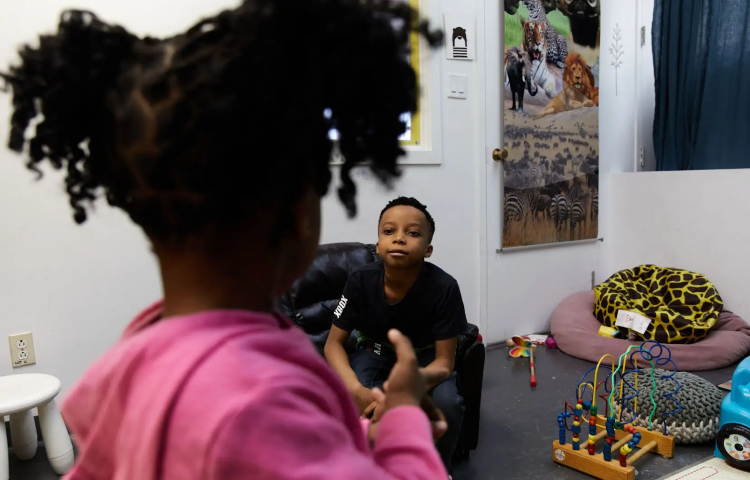

A Nigerian family, including a paralyzed child, was left homeless in Montreal after PRAIDA denied them shelter. Amid increasing cases, community organizations step in, calling for government action.
Refused by the temporary government accommodation supposed to accommodate them, asylum seekers — and an increasing number of families — are forced to sleep on the streets. This is what happened to Henry Aguamba and his wife, Tessy, originally from Nigeria, who spent the night of April 29 to 30 in front of the Bonaventure metro entrance with their three children, the eldest of whom is in a wheelchair.
"It rained a lot. The children were shivering from the cold and I was shivering too, but I didn’t want them to see it,” Tessy Aguamba told Le Devoir, bursting into tears.
Arriving in Montreal on April 28, the family, who held visitor visas, preferred to wait and spend a first night in a hotel, terrified of being immediately sent back on a flight if they requested asylum in the airport. The eldest, aged 10, became paraplegic last summer, after being shot in the spine during an attack by bandits while the family was driving to Abuja to collect their visas at the embassy.
The day after their arrival in Montreal, having no money or relatives, the Aguambas knocked on the door of the downtown YMCA, one of the accommodation centers of the Regional Welcome and Development Program. integration of asylum seekers (PRAIDA) managed by Quebec. But the couple and their three children, aged 3 to 10, were refused, having no proof of their asylum application.
Staff at the Montreal office of Immigration, Refugees and Citizenship Canada (IRCC) referred them to the website to complete an application. Night has fallen. They took her outside. “We no longer had hope,” said Henry Aguamba, his throat tight with emotion.
Photo: Julien Cadena Le Devoir The eldest child of the family, aged 10, became paraplegic last summer, after being shot in the spine during an attack by bandits while the family was driving to Abuja, on their way to collect your visas at the embassy A good Samaritan, who found them soaked and cold in the early morning, took them to the Welcome Collective. “Is this how we welcome people? » says Maryse Poisson, a worker for this organization that helps new arrivals.
It was the second family in a week who came to see her for refusal of accommodation from PRAIDA. “And we had others. A father and his two children slept for four days on the sidewalk in front of the PRAIDA offices,” says Ms. Poisson.
No acknowledgment, no services Anyone who does not request refuge directly from a border agent at the airport does not have access to services and temporary accommodation from the provincial and federal governments.
But when subsequently made at an IRCC office, so-called “internal” asylum requests involve filling out long online forms on the IRCC portal and other complex procedures, difficult to complete without legal assistance.
Once the request is sent, it takes several days, sometimes a few weeks, before obtaining acknowledgment of receipt. And this is where the problem lies: without this precious key, the doors to government services, including accommodation, remain closed.
This concerns us, because it is a public service, funded by the Quebec Ministry of Health, and apparently, it chooses to leave families outside in an unfair and cruel way.
—Arthur Durieux “Because of the delays, they fall through the cracks of the system,” noted Florence Bourdeau, coordinator of the Regroupement des organizations en accommodation des Personnes Migrants (ROHMI). “There are holes in the course. We do not always understand what the PRAIDA criteria are, why certain people are accepted and not others. »
Maryse Poisson finds it “shocking” that more and more families find themselves homeless. “I can't believe governments can't make exceptions for families with children,” she said.
READ ALSO Ideas | The dignity of migrants is non-negotiable Quebec accused of excluding organizations experienced in sponsoring refugees Accompagnement Québec is perhaps not well-known enough, admits Christine Fréchette Full organisms With around thirty beds for migrants, the Le Pont organization is currently full, but its manager, Arthur Durieux, says he is regularly contacted by other organizations. “At least once a week, I get called to ask if I have room for a family who is outside. »
He deplores that despite several pleas, PRAIDA has remained unmoved. “There is no opening,” said Mr. Durieux. “It concerns us, because it is a public service, funded by the Quebec Ministry of Health, and apparently, it chooses to leave families outside in an unfair and cruel way. »
Aside from temporary government accommodation, few options are available to asylum seekers waiting for their acknowledgment of receipt from IRCC. The City of Montreal has no shelter for asylum seekers.
Having an 'Identity Verified' badge or being 'Identity Verified' simply indicates that an individual has submitted information to complete our identity verification process or we have conducted internal verification using various authorized websites. While this process includes safeguards, it does not guarantee that the person is who they claim to be.
If you encounter any issues with this profile, please report them here. While all consultants who are verified have RCIC ID, we may not have the latest data in terms of their renewal/cancellation/discontinuation of their RCIC ID.
The "Verified Consultants" profiles are created using publicly available information, including data from the IRCC website, official consultant sites, other listing platforms, and social media. Immiperts.com is an independent platform, not affiliated with IRCC or any registered immigration consultants. To update, claim, or remove your profile, please contact us at [email protected].
╳